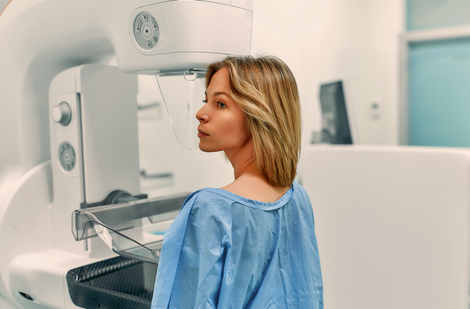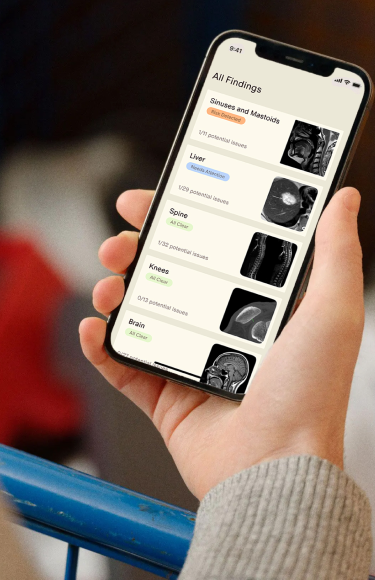Explore how MRI exams can enhance your health by enabling early disease detection. Join our waiting list for updates on preventive checks!
In today's fast-paced world, where health is our most valuable asset, Magnetic Resonance Imaging (MRI) offers an advanced way to pursue a proactive approach in personal health care. With the ability to detect a variety of diseases across different tissues and organs, an MRI is not just a step toward diagnosis; it's a step toward security.
Early detection during an MRI exam can make a crucial contribution to improving the long-term prognosis and course of many diseases.
Below, we provide an overview of the most important MRI exams and which diseases or changes can be detected therein.
Key Facts
- MRI of the Head: Detects tumors, circulatory disorders, inflammatory and degenerative diseases, and head injuries.
- MRI of the Female Breast: Suitable for suspected breast cancer, dense breast tissue, and post-surgery monitoring.
- MRI of the Spine: Diagnoses herniated discs, spinal instability, spinal stenosis, and inflammatory diseases.
- MRI of Bones, Joints, and Soft Tissues: Examines joint wear, tumors, inflammatory diseases, and bone tissue circulation disorders.
- MRI of Blood Vessels and Heart: Assesses heart valve function, heart muscle diseases, inflammations, heart failure, and vascular diseases.
- MRI of Internal Organs: Diagnoses diseases of the liver, kidneys, spleen, gallbladder, pancreas, and gastrointestinal tract.
MRI of the Head
An MRI of the head can be performed for symptoms like headaches, dizziness, or a feeling of pressure, but also when there is an existing suspicion of certain diseases. These include:
- Tumors and malformations of the head
- Exclusion of metastases
- Circulatory disorders, e.g., due to vascular constrictions in the brain
- Pathological vascular dilations (aneurysm)
- Inflammatory diseases of the brain (e.g., Multiple Sclerosis)
- Degenerative diseases of the brain (e.g., Alzheimer's)
- Inflammatory diseases of the meninges (Meningitis)
- Post-traumatic conditions and late effects of head injuries (traumatic brain injury)
- Pediatric developmental disorders or malformations of the brain
- Epilepsy
Additional symptoms that may require an MRI: Dizziness, tinnitus, changes in speech or vision, sudden memory losses, or personality changes.
MRI of the Female Breast
MRI mammography is suitable for women at high risk for breast cancer or with suspected breast cancer. The MRI is performed in a prone position. An MRI of the breast is used when mammography or a breast ultrasound does not provide a clear finding, e.g.:
- When a biopsy (tissue sampling) is not possible
- In women with very dense breast tissue
- For monitoring tumor development during treatment
- Differentiation between scar tissue after breast surgery and a new tumor (recurrence)
- Examination of women with breast implants
- Presence of certain genetic risk factors (e.g., BRCA mutation)
Additional symptoms that may require an MRI: Unexplained changes in breast size or shape, skin retractions, changes in the nipple, or unusual fluid discharge.
MRI of the Spine
Depending on the affected region, an MRI of the cervical spine (C-spine), thoracic spine (T-spine), or lumbar spine (L-spine) can be performed. An MRI of all three areas simultaneously is also possible. An MRI of the spine can detect changes in the spine, discs, and spinal cord, including:
- Herniated discs / disc protrusions
- Degenerative disc changes
- Narrowing of the spinal canal (spinal stenosis)
- Vertebral instability or slippage
- Wear of vertebral joints (osteoarthritis)
- Vertebral fractures
- Spinal cord injuries
- Metastases and/or tumors of the bony spine, spinal cord, spinal nerves, spinal canal, or soft tissues
- Inflammations of the vertebrae (e.g., Ankylosing Spondylitis, Spondylodiscitis), discs, and spinal cord (e.g., Multiple Sclerosis), as well as soft tissues
Additional symptoms that may require an MRI: Persistent back pain, numbness or weakness in arms or legs, difficulties walking or standing, unexplained weight loss, or fever.
MRI of Bones, Joints, and Soft Tissues
An MRI can also be used to examine bones, joints, cartilage, muscles, and tendons for injuries, structural anomalies, or other pathologies. The most common diseases of bones and joints include:
- Joint wear (osteoarthritis)
- Tumors
- Inflammatory diseases
- Congenital anomalies
- Circulatory disorders in bone tissue (osteonecrosis)
Additional symptoms that may require an MRI: Pain in joints or bones, swelling or stiffness in the joints, limited mobility, unexplained muscle weakness.
MRI of Blood Vessels and Heart
MRI imaging of blood vessels (angiography) and the heart includes various applications such as examining heart function, diagnosing heart defects, and detecting circulatory disorders:
- Assessment of the functionality of heart valves: e.g., constrictions (stenoses) or leaks (insufficiencies)
- Detection of inflammations of the heart muscle and pericardium (myocarditis and perimyocarditis)
- Diagnosis and assessment of genetic and acquired diseases of the heart muscle (cardiomyopathies) such as Hypertrophic Cardiomyopathy (HCM)
- Assessment of cardiac storage diseases (e.g., Amyloidosis and Sarcoidosis)
- Diagnosis and assessment of cardiac tumors (e.g., benign myxomas and malignant sarcomas)
- Diagnosis in heart failure
- Pathological changes in the large vessels (e.g., aortic aneurysm, occlusions)
Additional symptoms that may require an MRI: Chest pain, irregular heartbeat, shortness of breath, swelling in legs or feet, fatigue or weakness that develops without apparent reason.
MRI of Internal Organs
An abdominal MRI examines the abdominal cavity and can depict diseases in the abdominal organs. These include:
- Liver diseases (fatty liver, cirrhosis)
- Tumors of the adrenal glands, liver, gallbladder, pancreas, kidneys, spleen, ureters, and bladder
- Enlarged spleen
- Abnormalities of the gallbladder or bile ducts (e.g., gallstones)
- Hydronephrosis
- Kidney infection
- Kidney stones
- Changes in the uterus (e.g., fibroids, malignant tumors)
- Changes in the ovaries (e.g., cysts, malignant tumors)
- Endometriosis
- Cysts
- Enlarged lymph nodes
- Changes in the large abdominal vessels
- Tumors of the gastrointestinal tract
- Prostate cancer
Additional symptoms that may require an MRI: Unexplained abdominal pain, digestive problems, changes in bowel habits, unexplained weight loss, jaundice, or changes in urine or stool color.
Take charge of your health and join the waiting list to learn more about preventive full-body checks. We will inform you as soon as preventive MRI checks are available. Seize the opportunity to care for your health early on.






